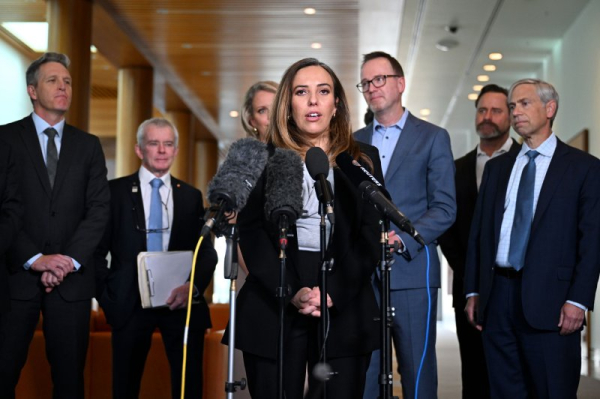
Stella Assange, wife of WikiLeaks founder Julian Assange, flanked by members of the Bring Julian Assange Home Parliamentary Group, urged journalists covering a press briefing in Canberra to lodge FOI requests with the U.S. government to get to the truth about her husband’s case. Photo by Lukas Coch/EPA-EFE
Julian Assange’s wife, Stella Assange, urged the international journalism community Thursday to use Freedom of Information requests to obtain details from the U.S. government surrounding Assange’s espionage prosecution as his plea deal prohibits him from doing so himself.
Speaking at a press conference at Parliament House in Canberra hosted by the Bring Julian Assange Home Parliamentary Group, Stella Assange directly appealed to press present to continue digging to get to the bottom of the way the United States dealt with her husband’s case. Advertisement
Responding to a question about whether Julian Assange would be telling his story and whether any book deals were in the works, Stella Assange questioned the restrictions placed on Assange by the terms of the plea agreement under which the case was brought to a close.
“Julian isn’t allowed to request freedom of information, make information requests to the U.S. government. But you can and I encourage you to. Why would they want him not to do that? So please do,” she said. Advertisement
She suggested this week’s breakthrough that saw Julian Assange a free man after being sentenced to time served — 62 months in London’s Belmarsh Prison — was because he had in May been granted permission by the High Court to appeal his extradition to the United States on grounds that, as an Australian, it was unclear whether he would be able to rely on a First Amendment defense.
“If Julian pleaded guilty in federal court in Saipan, it’s because he was pleading guilty to committing journalism,” Stella Assange said.
“This case criminalizes journalism — journalistic activity, standard journalistic activity of news gathering, and publishing. And so this is the reality of this prosecution. The case should never have been brought.”
She batted away questions about what Julian Assange would do if he had access to classified documents again in the future or whether there would be a WikiLeaks 2.0 “soliciting information from Russian hackers and other international figures,” a reference to the leaking in the run-up to the 2016 U.S. presidential election of tens of thousands of emails stolen from the accounts of the Democratic National Committee and Democratic nominee Hilary Clinton’s campaign manager John Podesta. Advertisement
Stella Assange insisted her husband was the most principled man she knew and that he would always “defend human rights and speak out against injustice” and that now that he was free, he could choose how he did that.
The Assange team also revealed more details of the plea bargain Julian Assange signed with the U.S. Justice Department confirming that it required him to destroy any information still in his possession that was U.S.-related that was unpublished, or in possession of WikiLeaks affiliates.
His U.S. Counsel Barry Pollack said Julian Assange had complied with the order and issued an instruction to the editor of WikiLeaks to destroy any leftover material that had not been published.
However, he pushed back on comments by U.S. State Department spokesman Mathew Miller claiming Julian Assange’s leaks, unredacted, of classified State Department cables and military files had “put the lives of our partners, our allies, and our diplomats at risk, especially those who work in dangerous places like Afghanistan and Iraq.”
Miller said those put in danger included opposition leaders and human rights activists around the world.
Pollack said the U.S. federal judge who heard the case in Saipan on Wednesday had stated in court that there was no evidence anyone had come to any harm as a result of Julian Assange’s actions. Advertisement
Julian Assange’s team also confirmed they planned to shift the emphasis of their campaign to trying to secure a presidential pardon with his U.S. counsel Barry Pollack saying that he expected public and political pressure would again gather steam and while it would likely “take some time” and that “this or a future president would have the wisdom the pardon him.